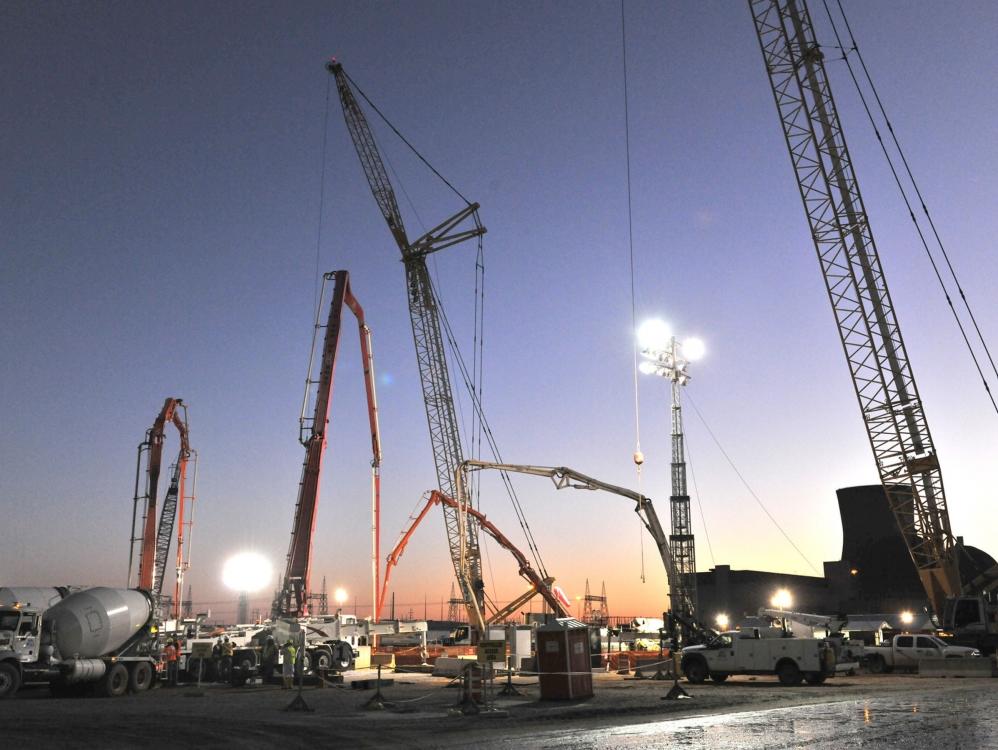
Section Branding
Header Content
Co-owners sue Georgia Power in $695M Vogtle contract dispute
Primary Content

The owners of a majority share of a nuclear power plant being expanded in Georgia are suing lead owner Georgia Power Co., claiming the company is trying to bilk them out of nearly $700 million by unilaterally changing a contract.
The lawsuits, filed in recent days in state court in Atlanta by Oglethorpe Power Corp. and the Municipal Electrical Authority of Georgia, lay out the clearest version yet of a contract dispute that's been simmering for months.
At issue are the billions in cost overruns for a third and fourth nuclear reactor being built at Plant Vogtle, east of Augusta. If Oglethorpe and MEAG win, it could hold down bills for the millions of customers of electric cooperatives and municipal utilities in Georgia, as well as for customers of the municipal utility in Jacksonville, Florida, and for some Alabama cooperative and municipal utility customers.
If Georgia Power loses, the shareholders of its parent, Atlanta-based Southern Co., would most likely have to absorb more losses. The company has said it's unlikely that its regulator, the Georgia Public Service Commission, will let Georgia Power charge customers above a certain amount for Vogtle.
Oglethorpe and MEAG say a judge should enforce the contract and order Georgia Power to repay disputed amounts, plus interest and attorneys fees. They aren't trying to stop completion of the Vogtle units east of Augusta.
"Despite its solemn, written promise to accept increased responsibility for cost overruns over the threshold, Georgia Power has quite simply reneged. The time has come for Georgia Power to honor its agreement," MEAG's lawyers wrote in the Fulton County Superior Court lawsuit.
Georgia Power spokesperson Jacob Hawkins said the company hasn't seen the lawsuit and "will continue to engage with our co-owners productively."
At issue is a 2018 deal. Oglethorpe threatened to back out unless it was protected from additional overruns. Because Oglethorpe's 38 cooperatives and MEAG's 49 municipal utilities don't have shareholders, unlike Georgia Power, there's no one to absorb overruns except electric customers.
Georgia Power owns 45.7% of the two reactors, compared to Oglethorpe's 30% and MEAG's 22.3%. The city of Dalton's utility owns the remaining 1.6% and hasn't sued.
Georgia Power agreed that above a certain point, it would pay 55.7% of the next $800 million in construction costs, and then 65.7% of the next $500 million. Those extra contributions total $180 million. After that, the co-owners can require Georgia Power to cover all remaining overruns. In exchange, the co-owners would sell part of their ownership shares to Georgia Power.
Oglethorpe and MEAG say the agreement activates once shared construction costs rise $2.1 billion above $17.1 billion. That doesn't count financing costs and some other costs. Associated Press calculations show the reactors will cost at least $30.34 billion overall.
Oglethorpe and MEAG say Georgia Power should already be paying higher shares of construction costs under the agreement. Oglethorpe announced on Saturday that it will freeze its costs and force Georgia Power to pay additional overruns in exchange for part of Oglethorpe's ownership, saving Oglethorpe a projected $400 million.
But Georgia Power says the base construction cost should be $18.38 billion and that the agreement doesn't kick in until shared costs reach $20.48 billion. If Georgia Power can raise all the thresholds in the agreement by $1.3 billion, the other owners would have to pay an extra $695 million.
Southern Co. has acknowledged it will have to pay at least $440 million more to cover what would have been other owners' costs, saying other amounts are in dispute.
Georgia Power has also argued that COVID-19 was an act of God that drove up costs and delayed work, and it shouldn't have to pay for that slowdown, although that claim is barely mentioned in the lawsuits.
Oglethorpe and MEAG say Georgia Power has continued to bill them for the original shares of the construction costs in recent months, and not reduced shares. Months of private talks preceding the lawsuits produced no agreement.
Vogtle is the only nuclear plant under construction in the United States. Its costs and delays could deter other utilities from building such plants, even though they generate electricity without releasing climate-changing carbon emissions.
When Vogtle was approved in 2012, the reactors were estimated to cost $14 billion, with the first electricity being generated in 2016, compared to 2023 now.

